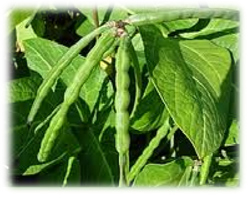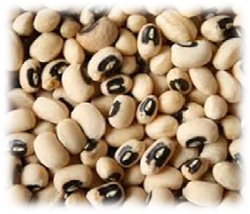Products - Health & Nutrition Benifits
Cowpea Health benefits & Nutritional facts
Cowpea
Nutrient content of mature cowpea seed (average of eight varieties)
Cowpea Nutritional Facts
Nutrient content of mature cowpea seed (average of eight varieties)
Cowpea Nutritional Facts
| Serving Size 1/4 cup | |
| Servings per Container — | |
| Amount Per Serving | |
| % Daily Value* | |
| Total Fat 0.5 g | 1% |
| Saturated Fat 0.1 g | 1% |
| Trans Fat | — |
| Cholesterol 0 mg | 0% |
| Sodium 7 mg | 0% |
| Potassium 464 mg | 13% |
| Total Carbohydrate 25 g | 8% |
| Dietary Fiber 4 g | 18% |
| Sugars | 3 g |
| Protein | 10 g |
| Vitamin A | 0% |
| Vitamin C | 1% |
| Calcium | 5% |
| Iron | 19% |
| Copper | 0% |
| Folic Acid | - |
| Iodine | - |
| Magnesium | 19% |
| Niacin | 4% |
| Phosphorus | 18% |
| Riboflavin | 6% |
| Thiamin | 24% |
| Vitamin B12 | - |
| Vitamin B6 | 7% |
| Vitamin D | - |
| Vitamin E | 1% |
| Zinc | 9% |
| Protein | 24.8% |
| Fat | 1.9% |
| Fiber | 6.3% |
| Carbohydrate | 63.6% |
| Thiamine | 0.00074% |
| Riboflavin | 0.00042% |
| Niacin | 0.00281% |


Cowpea is rich in potassium with good amount of calcium, magnesium and phosphorus. It also has small amount of iron, sodium, zinc, copper, manganese
Vitamin content of cowpea
Cowpea is rich in vitamin A and C. It has good amount of thiamin, riboflavin, niacin, vitamin B6 and pantothenic acid. It also has small amount of folate.
Calorie content of cowpea
100g of Cinnamon has 44 calories. Calories
Health benefits of cowpea
Cowpea tones the spleen, stomach and pancreas ; it helps induce urination and relieves damp conditions like leucorrhoea.
The soluble fiber found in these beans have a low glycemic index and provide low risk for diabetes.
The high fiber content also plays an important role in improving diabetes.
They are rich in lignans, which may play a role in preventing osteoporosis, heart disease, and certain cancers.
The flavonoids in beans may help reduce heart disease and cancer risk.
Phytosterols present in the beans help reduce blood cholesterol levels.
They are low in fat and sodium and contain no cholesterol.
Vitamin content of cowpea
Cowpea is rich in vitamin A and C. It has good amount of thiamin, riboflavin, niacin, vitamin B6 and pantothenic acid. It also has small amount of folate.
Calorie content of cowpea
100g of Cinnamon has 44 calories. Calories
Health benefits of cowpea
Cowpea tones the spleen, stomach and pancreas ; it helps induce urination and relieves damp conditions like leucorrhoea.
The soluble fiber found in these beans have a low glycemic index and provide low risk for diabetes.
The high fiber content also plays an important role in improving diabetes.
They are rich in lignans, which may play a role in preventing osteoporosis, heart disease, and certain cancers.
The flavonoids in beans may help reduce heart disease and cancer risk.
Phytosterols present in the beans help reduce blood cholesterol levels.
They are low in fat and sodium and contain no cholesterol.

